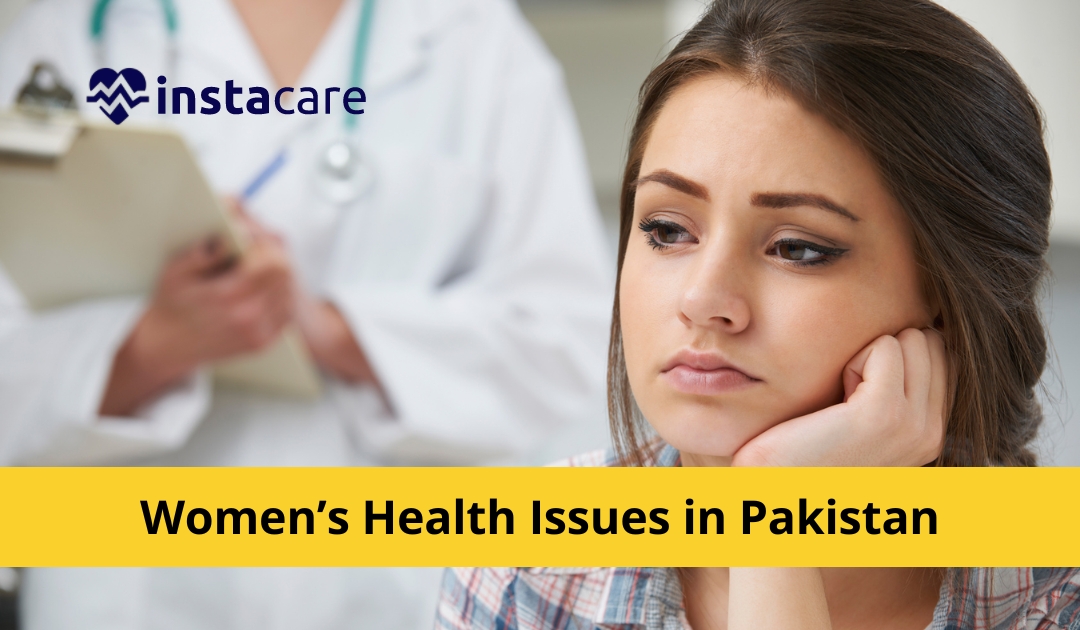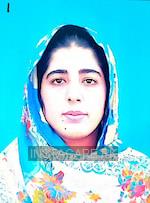Overview of Women’s Health Issues in Pakistan
Women's health issues in Pakistan remain a major concern, with poor access to healthcare, high maternal mortality rates, and lack of education having significant impacts on the wellbeing of women living in this region. From malnutrition to HPV-related cancers and rampant forced marriages, these are among some of the most prominent challenges facing females across the country.
In this blog post we'll explore 10 such issues considered critical for women’s health — from breastfeeding during pregnancy to struggle against gender-based discrimination. We'll examine how each problem presents itself and how measures can be taken for mitigating them at both a state as well as individual level. Whether you're an informed citizen or just starting out learning about these crucial topics – everyone needs insight regarding women’s rights in Pakistan! So let’s get started talking about women's health outlook.
Women’s Top 10 Health Issues
1- Heart Disease
Women’s health issues in Pakistan are growing concerns in the global community due to the prevalence of diseases, such as heart disease, that disproportionately affect women’s health. Women in Pakistan suffer from an alarming rate of cardiovascular incidents: coronary artery disease, atherosclerosis, stroke, and other serious ailments related to poor diet and lack of exercise and medical resources.
Women are more likely to die as a result of heart complications than men in Pakistan. They also bear the double burden of suffering disproportionately from preventable diseases while also facing systemic discrimination in access to medical care due to cultural expectations placed on women within the country. Women must be given more access to proper health services with an emphasis on the prevention, diagnosis and treatment of heart disease.
To this end, government and non-governmental organizations should prioritize these efforts and work together in providing economic support for woman-specific treatments for cardiac-based conditions across Pakistan.
2- Breast Cancer
Women in Pakistan face a variety of complex Women's Health issues and Breast Cancer is one of them. It is the second leading cause of death among women, in particular those between the ages of 35-55. In order to combat its spread, it is essential to understand some basic facts about breast cancer. One is that the early stages carry less severe symptoms and become more aggressive with time.
Women should also seek regular checkups with their doctor to help detect any changes in the breast which could indicate something more serious. With early detection rates increasing, we can make great strides against this disease and improve Women's Healthcare in Pakistan significantly.
3- Gynecological Health Issues
Women’s gynecological health issues are increasingly becoming a major cause of concern in Pakistan, ranging from vaginal discharge and menstrual cycle disturbances to infertility, postpartum depression and urinary tract infections. Women of all ages should be aware of their own individual signs, symptoms and risks associated with these issues in order to take the necessary preventative measures.
Women should also make sure they seek regular medical advice on any health issue they may face throughout their lives, as well as getting screened for any age-related problems like menopause or pregnancy. With early detection and targeted treatment, many of these common gynecological health problems will be able to be managed appropriately, thus leading to improved overall quality of life for women across Pakistan.
4- Vaginal discharge
Women’s health issues in Pakistan, such as vaginal discharge, often go unspoken and untreated. But it’s important to understand that vaginal discharge is a normal physiological phenomenon that every woman experiences, and which can indicate various conditions. Women may notice different types of discharge at different parts of their menstrual cycle – clear and stretchy discharge may be experienced during ovulation; white or yellow and thick like cottage cheese beforehand or afterwards.
The color, consistency, odor and amount of vaginal discharge are all indications of the body’s internal environment; changes in any of these areas can be signs of an infection, hormonal imbalance or other reproductive health problem. Women should seek professional advice if there is a notable change in their normal pattern to ensure they get the treatment they need.
View More: 12 Flaxseed Oil Benefits For Females - The Healthiest Oil
5- Menstrual Cycle
Women’s health issues in Pakistan are often overlooked or marginalized. One of the most important health topics affecting women is the menstrual cycle. The menstrual cycle is a monthly process by which a woman’s reproductive system prepares for potential pregnancy. Women typically experience symptoms during the cycle, such as hormonal fluctuations, mood changes, physical discomfort, and more.
It’s incredibly important to note that the menstrual cycle does not only affect a woman’s body but her overall wellbeing as well. Women’s awareness of the importance of care during this time must be emphasized if we want to maximize their health, especially in Pakistan where access to quality healthcare can be overwhelming difficult to attain.
6- Menopause
Menopause is an important time of life for women, and it affects women around the world differently. In Pakistan, women's health issues are uniquely related to menopause. Women in Pakistan often experience a lack of awareness about their reproductive rights and associated issues, making it difficult for them to understand menopause symptoms and changes. Women may also find it difficult to access quality healthcare due to inadequate health systems in the country at large.
Furthermore, cultural conditions often prevent Pakistani women from speaking openly about menopausal issues, denying them access to support systems that address menopausal health concerns. These complex patterns mean that Pakistani women may be unprepared for the physical and psychological effects of menopause and unable to easily access help. It is essential that more research and resources are dedicated toward understanding how best to support Pakistani women during this unique transition period in order for them to live full, healthy lives.
7- Infertility
Women’s health issues in Pakistan, including infertility, are becoming increasingly pressing. Infertility affects an estimated 15-20% of couples attempting to conceive, and is often rooted in a variety of physical, lifestyle, or even environmental factors. Women with fertility issues may suffer from medical conditions such as endometriosis or polycystic ovarian syndrome which can lead to hormonal imbalances and an inability to ovulate.
Treatment options may include various medications to control hormone levels, as well as more invasive procedures such as in vitro fertilization (IVF). Ignorance surrounding the causes and treatments available for infertility often heightens the sense of distress among those suffering from it. Women's health advocates in Pakistan are working to raise awareness around infertility and other reproductive health issues, so that women can get the information and support they need.
8- Pregnancy & Postpartum
For women in Pakistan, pregnancy and postpartum can lead to a variety of health issues. Women's health issues are not openly discussed or given proper medical attention, which can cause long-term complications for both mother and child. Lack of resources and basic education on health care can increase the risk of premature babies, low birth weight, malnutrition or even death for the mother.
Women should look for reliable sources to ensure that their bodies are healthy before, during and after childbirth; Proper nutrition throughout the process is vital to promoting physical, mental and emotional well-being. Women should also seek out support networks and be sure they have an understanding family while they navigate the complex process of pregnancy and postpartum.
9- Osteoporosis
Women's Health Issues in Pakistan are numerous and include Osteoporosis. This is a bone condition that causes the bones to become brittle and prone to fracture. Women tend to be at higher risk due to menopause-related hormonal changes that weaken bones, as well as lack of calcium in their diets.
Women of all ages should talk to their physicians about strategies for preventing and managing Osteoporosis, such as consuming adequate dietary calcium, getting enough vitamin D through exposure or supplementation, adding weight-bearing activities into daily routines, smoking cessation, moderate alcohol consumption, and possibly taking medications.
Women should also ask their doctor about regular bone density tests that can assess Osteoporosis risk and help guide preventive strategies early on.
10- Osteoarthritis
Women's Health Issues in Pakistan are often overlooked, yet Osteoarthritis is a commonly occurring problem which afflicts many women especially during later life. As the most common type of arthritis, Osteoarthritis is characterized by pain and stiffness in affected joints as well as degradation of cartilage leading to limited joint movement.
Women can experience a range of symptoms ranging from mild to severe and may benefit from medication, physiotherapy or even simple lifestyle modifications such as losing weight. Women who suffer from Osteoarthritis should talk to their doctor about the best treatments for them, including surgical options if needed.
Psychiatric Disorders
Women's health issues such as depression, anxiety, post-traumatic stress disorder and bipolar disorder are all psychiatric disorders that can cause a great deal of distress in someone's life. Women are also more likely than men to be diagnosed with these disorders and may experience symptoms differently or more intensely than men.
While there is no single answer as to why this is the case, it appears to be linked with psychological, environmental and biological factors including hormones, genetics and the social pressures placed on women. With thorough diagnosis, proper treatment and self-care individuals can dramatically improve the quality of their lives while living with a psychiatric disorder.
Diabetes
Women in Pakistan are particularly at risk of developing diabetes due to their tendency to ignore Women's Health issues like diet and exercise. Women with diabetes can suffer from a range of serious health complications such as vision problems, kidney disease, and stroke. Fortunately, there are steps that women can take to help reduce their risk of developing this serious condition, from regular exercise and healthy eating habits to preventive check-ups.
Women should be especially aware if they have family members who have diabetes or hypertension, as these conditions increase the likelihood of getting diabetes in the future. Taking steps now can significantly reduce the risk of being diagnosed with diabetes later in life.
View More: 8 Fenugreek Benefits For Females
Endocrine Disorders
Women's health issues pertaining to the endocrine system are often overlooked, leading to misdiagnosis or a delay in diagnosis for a number of disorders. Endocrine disorders, such as hyperthyroidism, hypothyroidism, and polycystic ovarian syndrome (PCOS), can be difficult to diagnose due to the complexity of the endocrine system and common unawareness that endocrine issues can lead to other symptoms such as fatigue, depression, and weight gain.
Women should be informed about these possible indicators of an underlying issue with their hormones in order to prioritize seeking medical attention should any of these additional symptoms present themselves. With advanced technology and further understandings of endocrinology increasing every day, the door is open for more effective approaches to diagnosing—and ultimately treating—endocrine disorders.
Anemia
Women’s Health Issues in Pakistan are a complex problem and Anemia is unfortunately no exception. Women, especially pregnant women, are especially vulnerable to Anemia due to the body's increased demand for iron during pregnancy. Women living in poverty or with reduced access to medical care are the most affected and with inadequate nutrition, may experience severe symptoms such as fatigue, paleness, rapid heartbeat and shortness of breath.
Recognizing and diagnosing Anemia is essential to providing preventative care, including dietary changes, regular blood tests and possibly supplements for iron, vitamin B12 or folate depending on individual need. Providing this kind of vital attention could make all the difference in improving Women’s Health Issues in Pakistan.
Stroke
Women's Health Issues in Pakistan are often overlooked, however stroke is a major health concern that affects both men and women. Women of all ages are at risk for stroke and its effects can be economically devastating for families. Women are particularly vulnerable to the harms of stroke due to inadequate education about the signs and symptoms of this condition in Pakistan, as well as a lack of preventative screening measures.
Women can reduce their risk of stroke by educating themselves about common signs, leading a healthy lifestyle, recognizing any changes in health or behaviour such as numbness on one side of the body or sudden confusion, and getting regular check-ups with their doctor. Women's Health Issues in Pakistan must not be ignored - stroke prevention is integral to any comprehensive healthcare strategy.
Sexual Health
Women’s health issues in Pakistan often go unrecognized and unaddressed. Women are usually excluded from decision-making and policy-making in the country that affects their health, resulting in difficulty accessing sexual health services with regards to contraception and other needs. Women may not understand the importance of preventive measures to protect their reproductive and sexual health, or feel too embarrassed to seek help, leaving them vulnerable to a variety of complications such as sexually transmitted diseases, infertility, cervical cancer, unplanned pregnancies, and more.
To combat this problem, it is crucial that women are given the knowledge they need to make sound decisions about sexual health along with easy access to healthcare professionals who will be available to support them every step of the way. This can ultimately lead to better sexual health outcomes for women in Pakistan.
How Can We Improve Women’s Health?
Women’s health is a critical issue in Pakistan and around the world. Women face unique health issues that need to be addressed, such as prenatal and pediatric care, chronic illnesses, mental health concerns, reproductive rights, and more. Women’s access to healthcare must be improved in order to address these issues. Providing safe and affordable public healthcare services is one way that we can start improving women’s health.
Additionally, better awareness needs to be spread about preventative care options such as exercise, diet and checking regular checkups with healthcare providers. We must also advocate for changes in policy to make sure all women are afforded equal access to treatment. Women's health is a global issue that demands attention and action: by taking steps towards making Women's Health a priority we can reduce Women’s suffering worldwide.
Conclusion
Although most of the healthcare issues in Pakistan are gender-neutral, there are some women’s health issues that are unique to our country. The top 10 women’s health issues in Pakistan include maternal mortality, cervical cancer, obstetric fistula, early marriage and pregnancy, female genital mutilation, domestic violence, depression, and breast cancer. While some of these problems are more common in rural areas, all Pakistani women face risks when it comes to their health. To address these issues, we need better access to quality healthcare, improved education and awareness about women’s rights and health concerns, and stronger policies to protect women from violence.
Please book an appointment with the best Sexologist in Lahore, Karachi, Islamabad, and all major cities of Pakistan through InstaCare, or call our helpline at 02137136090 to find the verified doctor for your disease.
Source: https://instacare.pk/blog/womens-health-issues-in-pakistan












